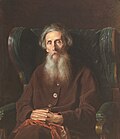
This list of Russian linguists and philologists includes notable linguists from the Russian Federation, the Soviet Union, the Russian Empire and other predecessor states of Russia.

This list of Russian linguists and philologists includes notable linguists from the Russian Federation, the Soviet Union, the Russian Empire and other predecessor states of Russia.






